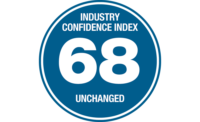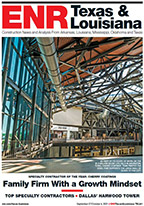Employee shortages and cost increases will impact firms' bottom lines and growth plans in the year to come, according to data from ENR's Fourth Quarter Construction Industry Confidence Index (CICI) survey on hiring and anticipated salary increases.
Among the 213 respondent firms, 77.5% said they planned to add staff in 2017. ENR also asked about planned raises in 2017. The average raise among the 180 firms providing estimated percentage increases was 4.11%. Only one firm expected to cut pay in 2017. About 7% are offering raises that exceed 6%, and more than one-quarter cite hikes of 5%.
Contractors that responded report the highest anticipated raises, averaging 4.25%, followed by subcontractors at 4.03% and design firms at 3.93%.
By revenue, all firms in the $100-250 million range are offering the largest raises, averaging 4.46%; followed by the smallest companies under $10 million, averaging 4.44%. The smallest raises will come at the largest firms over $250 million, which estimate raises ahead at 3.58%
Project managers were cited as the type of employee most in demand, noted by more than half of respondents.
"The shortage has slowed our growth immensely. We would be growing at twice the speed if we could find good people," says Jason Albu, CEO of Albu & Associates, a small general contractor and construction management firm in Winter Park, Fla. "We are over-hiring. If we have an opening for three, we hire four or five, and hope two or three work out."
He adds that "Everyone is doing everything they can to differentiate themselves and one up the next guy to draw in good talent."
In a separate quarterly market trends survey by the Construction Financial Management Association, economist Anirban Basu says members worry that a steadily growing market will put pressure on labor and materials costs. He notes that 55% of that survey's respondents say margins are improving now, but only 40% expect continued improvement in the year ahead.
CFMA members have feared increasing costs from labor shortages for several years, with 80% of members citing them as their key concern in the most recent quarterly survey.




